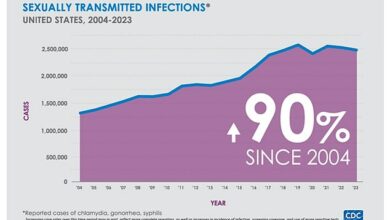Guilt-Free Ultra-Processed Foods That ARE Healthy, According to The Nutrition Twins





It’s no longer a secret that processed foods are less healthy than fresh, whole foods.
As convenient as they are, a diet consisting of processed foods has been linked to diabetes, high blood pressure, obesity, joint pain and heart disease.
But we know that not everyone can eat healthy all the time and prepare meals 100 percent of the time, so that doesn’t mean you can’t add convenience foods to your diet.
When it comes to processed foods, we recommend looking for products with protein and fiber to help you feel full, and with as little added sugar as possible.

The Nutrition Twins – Tammy and Lyssie – give their recommendations for healthy choices when it comes to processed foods
Processed and ultra-processed foods are industrially produced and contain ingredients you wouldn’t normally see on supermarket shelves, such as artificial sweeteners, colors and preservatives.
But not all options are created equal and some options have better nutritional value than others.
So the next time you’re in the snack or frozen food aisle, follow our recommendations to make the best choices when it comes to navigating the grocery store shelves.
Protein powders
Let’s start with a controversial one: protein powders. They can be expensive, but they often make a great snack in a smoothie, milkshake, yogurt, or flavored oatmeal.
Proteins are considered the most filling macronutrient. They help you feel fuller longer when you eat or drink them and suppress the desire for less healthy foods.
There is controversy over the optimal amount of protein, but we recommend most people consume about 100 grams or more per day. Protein powders make that a lot easier.
It’s best to find a powder that packs 20 to 25 grams of protein into a single scoop. And the less added sugar, the better.
A healthy calorie range for protein powders is between 120 and 180 calories, but aim for 160 or less.
Most brands are fine, but some people have a sensitive stomach. For these people, we recommend using an organic or plant-based protein powder or one with stevia or monk fruit as the main sweetener.
Thanks to the powdered varieties on the market, you can find a tasty dessert flavor that will satisfy your sugar cravings without spiking your blood sugar levels.
Protein is an especially important part of a senior’s diet. The body loses muscle mass and strength, as well as bone density, as it ages.
A high-protein diet can help compensate for this loss, keeping seniors safe and preventing falls.
One of the better protein powder options is from Clean Simple Eats. This company makes “clean” protein powders and green mixes that never contain artificial sweeteners, added flavors, or sugars. Their products contain 20 grams of grass-fed whey protein and zero artificial ingredients.
You can even turn any protein drink into a delicious milkshake by adding some ice cubes, a blender, and a frozen banana for sweetness, fiber, and potassium.

Clean Simple Eats makes a healthier protein powder with no added sugars or preservatives and has flavors inspired by desserts
Popcorn and other snacks
Snacking sensibly is easier said than done, especially when you’re faced with a myriad of tasty but nutritious options.
It can be especially challenging to find a healthy option that appeals to young children.
Popcorn is a typical crowd pleaser.
Healthy options contain few ingredients and never hydrogenated oils or other bad fats.
Many brands make lightly salted varieties or popcorn with lots of fiber, which will help you feel less hungry.
The winning snack contains a combination of proteins, whole grains and proteins.
Try LesserEvil Himalayan Pink Salt Popcorn. With only 3 ingredients, organic popcorn, coconut oil, and Himalayan pink salt, this is a winner in the sea of popcorn.

There are now healthier soft drink options that are fortified with prebiotics
We recommend buying their individual bags, as each bag only contains about 100 calories. Similar low-calorie products include Orville Redenbacher’s Smart Pop.
Avoid brands like Cracker Jack, which list sugar and corn sugar as the first two ingredients. Cracker Jack contains 14 grams of sugar in a small, half-cup serving, which is more than half of the maximum 25 grams of sugar that women and children should consume in an entire day.
And that is almost half of the maximum 35 grams of sugar that men may consume per day.
Whatever high-fiber, high-protein snack you choose, make sure it’s no more than 200 calories and eat it before you get really hungry. Otherwise, it won’t fill you up.
We (and our daughters) also love Made Good snacks. The company’s Granola Minis, for example, contain vegetable powder made from broccoli, carrots, tomatoes, beets and shiitake mushrooms, and the product keeps added sugar low.
Made Good snacks are considered processed foods, but unlike other processed snacks full of hydrogenated oils and high fructose corn syrup, Made Good combines healthy ingredients like oats, spinach, carrots, tomatoes, and beets.
Several bars and snacks from this brand also contain inulin, a powerful prebiotic fiber found in chicory.
Soda
The beverage industry is dominated by products that are loaded with added sugars and contain no nutrients whatsoever.
But telling someone to stop drinking soda or sweetened beverages is not realistic. We all crave a diet cola or root beer now and then.
An occasional diet soda won’t hurt.
And luckily for soda drinkers, there are now several options on the market that allow people to satisfy their cravings in a way that doesn’t compromise their health.
The options include soft drinks that are enriched with pre- and probiotics, with minimal sugar or naturally sweetened, without artificial additives. Some soft drinks even contain added nutrients and vitamins.
There is still debate as to whether the amount of prebiotic fiber in some soft drinks is enough to have an effect, but it appears that the benefits of these products outweigh the health risks associated with other, traditional soft drinks.
For this reason, we love Poppi and OliPop sodas. OliPop is a real winner when it comes to fiber, with nine grams — more than three times the prebiotic fiber of other brands, which is almost the same amount most Americans get in an entire day.
Americans are not getting enough fiber, getting only 12 grams of the recommended daily amount of 25 grams. These functional beverages can help.
Frozen products

Frozen foods typically contain huge amounts of sodium, preservatives and added flavors. Amy’s is a healthier alternative with all organic ingredients
Frozen foods are rarely healthy, as most brands add large amounts of sodium to preserve the products and add flavor.
But too much sodium is a known cause of high blood pressure and heart problems.
The American Heart Association recommends limiting sodium intake to 2,300 milligrams per day, with an even lower limit of 1,500 milligrams for people with high blood pressure, which is nearly half of American adults.
More than 70 percent of the sodium Americans consume primarily processed foods, including frozen meals.
Many frozen meals on grocery store shelves can contain more than 1,000 milligrams of sodium, more than half the recommended daily intake for 50 percent of U.S. adults.
Some frozen foods also contain saturated or trans fats, artificial colors and flavors, and other suspect ingredients.
Even so-called “healthy” options can contain some of the worst health boosters.
Sometimes they also contain an extremely high number of calories, making them unsuitable for our clients who want to lose weight.
Freezing is a way to preserve food so it doesn’t spoil quickly, but manufacturers often add other chemicals to extend shelf life. One of the most popular additives is butylated hydroxyanisole (BHA), which is found in everything from frozen burgers to burritos.
BHA is known for disturb the body’s endocrine system, a network of glands and organs that produce and store hormones. These hormones influence a wide range of body processes, from metabolism to reproduction.
It is also thought to be carcinogenic.
This is not to say that all frozen meals and TV dinners are always unhealthy.
There are tons of nutritious options available, but to determine which ones you have, you need to look at the ingredients list.
For example, Amy’s frozen foods are all organic and vegetarian. Saffron Road uses chicken that is raised free of antibiotics and healthy ingredients like expeller-pressed sunflower oil, ginger, garlic, turmeric, low-fat yogurt, chicken stock, and tomato paste.
Choose varieties that are low in calories, saturated fat and sugar, and not too high in sodium.
Breakfast bars
Choose options made with organic ingredients and plant-based proteins, like oats and nuts, and a natural sweetener, like honey.
Many bars on the market use super sweet corn syrup to make them more palatable.
Some studies show that a diet high in corn syrup may increase the risk of fatty liver disease, obesity, diabetes and other diseases.
Stronger varieties are also available with vegetable powder made from ground broccoli, carrots, tomatoes, beets and mushrooms.
Other good ingredients to look for on the label are chicory root, which contains prebiotic fiber, and oligofructose, which also contains prebiotic fiber, as well as a little sweetness that can enhance the flavor.
All these prebiotic fibers promote the growth of good bacteria in the colon, ensure a healthy gastrointestinal tract, maintain blood sugar levels and make you feel fuller for longer.
We are fans of the brands Kate’s Real Food and Made Good.
They have been able to create appealing products without cramming them with unwanted ingredients, instead using organic, healthy ingredients like oats, nuts and honey.
Kate’s Real Food has launched a new line of organic plant-based protein bars that are packed with fiber, healthy fats, and antioxidants. These bars use honey instead of processed sweeteners, while Made Good adds organic ground vegetables.




